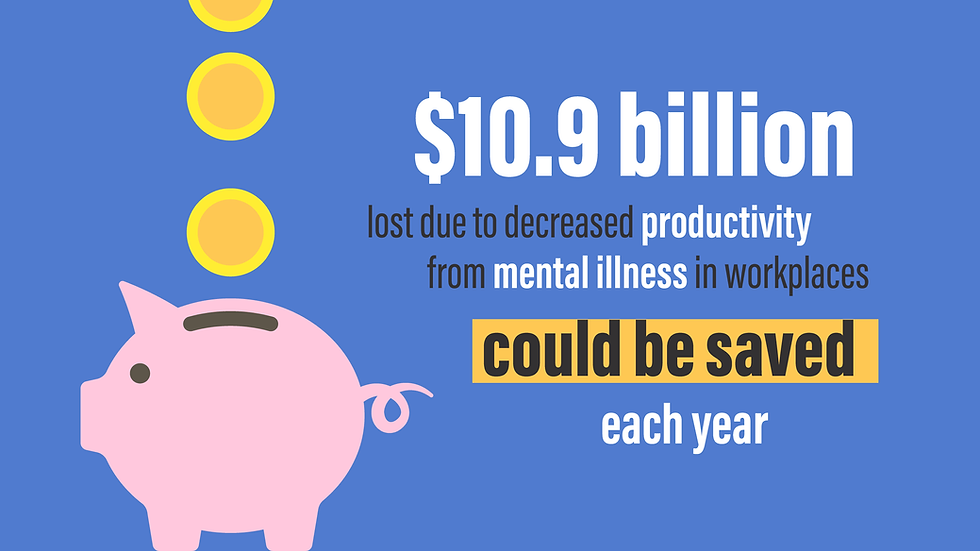Mental ill health is costing Australia $500 million a day - what steps do we need to take?
- Nov 4, 2019
- 3 min read

by Megan Orchard
The Future of Work Institute welcomes the Productivity Commission’s draft report into mental health, which highlights the rising issue of mental ill health in Australia.
Each year, approximately one in five Australians experience mental ill health, costing the economy an estimated $500 million per day.
The report states that “substantial reform of Australia’s mental health system is needed and there is no quick fix”. Importantly, there was recognition of the role workplaces can play in addressing mental health.
Research consistently demonstrates a clear relationship between work and mental health and wellbeing [1]. Poor quality work, such as roles with a high degree of repetition, low support or excessive workloads can cause significant harm not only to individuals, but also to organisations through declines in performance and productivity [2].
As an example, our recent research into the impact of FIFO work arrangements on the mental health and wellbeing of FIFO workers supports this, with results systematically linking work factors to the mental health, use of alcohol and other drugs, and wellbeing of FIFO workers [3].
Armed with the knowledge that work impacts mental health, coupled with a healthy return on investment for successfully implementing interventions to improve mental health in the workplace (estimated return of $2.30 for each $1 spent [4]), it makes sense for organisations to be targeting mental health.
However, from our experience, which mirrors the findings in the report, organisations are currently struggling with knowing what to do and how they can meet their duty of care in regard to the psychological health of their employees.
“A recent Australian survey [5] found that 16% of organisations have not addressed workplace mental health because they don’t know where to start. “
Put simply, the workplace mental health landscape can be confusing to navigate. Generally we find organisations who want to champion well-being are faced with a multitude of possible interventions resulting in confusion in how best to take action. Furthermore, robust evaluations of workplace interventions are typically lacking due to the practical difficulties of conducting such research within organisations. As such, research in this field is largely cross-sectional, meaning we are unable to definitively establish whether interventions are having a direct causal effect on mental health outcomes. This further exacerbates the confusion with how best to take action.
We also find that organisations are currently struggling with how best to identify and manage risks to psychological health in the workplace in order to meet their legal obligations. There is an increasing realisation that these cannot be managed the same as physical hazards in the work environment.
Professor Sharon Parker noted:
“We are now understanding the long-term impact of work on many physical and mental health outcomes. The quality of work can certainly support better mental health in the community”.
The commission’s draft report calls for action into these issues. It was recommended that psychological health and safety be made as important as physical health and safety in Workplace Health and Safety arrangements. They also recommended action be taken to develop codes of practices to assist employers better identify and manage psychological risks in the workplace and to collect and disseminate information on the effectiveness of workplaces programs and initiatives.
We at the Future of Work Institute are committed to addressing these issues through our Thrive at Work Initiative, which aims to equip organisations with the knowledge and tools to design healthy, high performing work environments. We aim to partner with industry and government to determine the best methods for evaluating psychosocial risks, implementing targeted interventions, and tracking long term the effectiveness of these interventions. Through leading-edge research and collaborative projects within industry we aim to generate new knowledge and contribute to evidence-based best practice that can be applied across industries.
The Future of Work Institute will make further submissions to the inquiry. Professor Mark Griffin welcomed the inquiry:
“Research over many years has identified the importance of mental health in the workplace. The next step is translating these insights into practical change that helps workers and organisations to be healthy and productive.”
References
1. Humphrey, S. E., Nahrgang, J. D., & Morgeson, F. P. (2007). Integrating motivational, social, and contextual work design features: a meta-analytic summary and theoretical extension of the work design literature. Journal of applied psychology, 92(5), 1332.
2. Parker, S. K. (2014). Beyond motivation: Job and work design for development, health, ambidexterity, and more. Annual Review of Psychology, 65, 661-691.
3. Parker, S. K., Fruhen, L., Burton, C., McQuade, S., Loveny, J., Griffin, M., … & Esmond, J. (2018). Impact of FIFO work arrangements on the mental health and wellbeing of FIFO workers.
5. Superfriend (2018). Indicators of a Thriving Workplace Survey.



